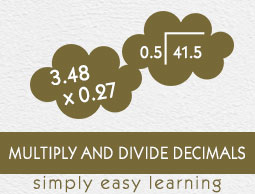
- Multiply and Divide Decimals
- Home
- Decimal Multiplication
- Multiplication of a Decimal by a Whole Number
- Decimal Multiplication: Problem Type 1
- Decimal Multiplication: Problem Type 2
- Multiplication of a Decimal by a Power of Ten
- Multiplication of a Decimal by a Power of 0.1
- Multiplication of Decimals That Have a Product Less Than 0.1
- Word Problem With Multiplication of Decimal and Whole Number
- Word Problem With Multiplication of Two Decimals
- Word Problem With Multiple Decimal Operations: Problem type 1
- Whole Number Division With Decimal Answers
- Division of a Decimal by a Whole Number
- Division of a Decimal by a 1-digit Decimal
- Division of a Decimal by a 2-digit Decimal
- Division of a Decimal by a Power of Ten
- Division of a Decimal by a Power of 0.1
- Decimal Division With Rounding
- Word Problem With Division of a Decimal and a Whole Number
- Word Problem With Division of Two Decimals
- Word Problem With Multiple Decimal Operations: Problem Type 2
- Average of Two Numbers
Exponents and Decimals: Products Less Than 0.1
Definition
In numbers such as (0.44)3, the decimal 0.44 is the base and 3 is the exponent. Such numbers are repeated products of the base.
Rules
We see that raising a decimal base to an exponent is same as multiplying the decimal by itself as many times as the exponent.
We treat the decimals as whole numbers by ignoring the decimal points and multiply.
After counting the total number of decimal places in these numbers, we put a decimal point after that many places from the right in the answer.
Here we are considering exponents of decimals where the products are less than 0.1.
Problem 1
Evaluate (0.31)2
Solution
Step 1:
Consider (0.31)2; Here, we are raising the decimal base 0.31 to a power of 2.
(0.31)2 = 0.31 0.31 = 0.0961
Step 2:
We see that squaring a decimal base is in fact same as multiplying the decimal by itself. We treat the decimals as whole numbers by ignoring the decimal points and multiply.
31 31 = 961
Step 3:
After counting the total number of decimal places which is four in these numbers, we put a decimal point after four places from the right in the answer.
So, 0.31 0.31 = 0.0961
We see that that the product is less than 0.1
Problem 2
Evaluate (0.46)3
Solution
Step 1:
Consider (0.46)3; Here, we are raising the decimal base 0.46 to a power of 3.
(0.46)3 = 0.46 0.46 0.46
Step 2:
We see that cubing a decimal base is in fact same as multiplying the decimal by itself three times. We treat the decimals as whole numbers by ignoring the decimal points and multiply.
46 46 46 = 97336
Step 3:
After counting the total number of decimal places which is six in these numbers, we put a decimal point after six places from the right in the answer.
So, 0.46 0.46 0.46 = 0.097336
We see that that the product is less than 0.1